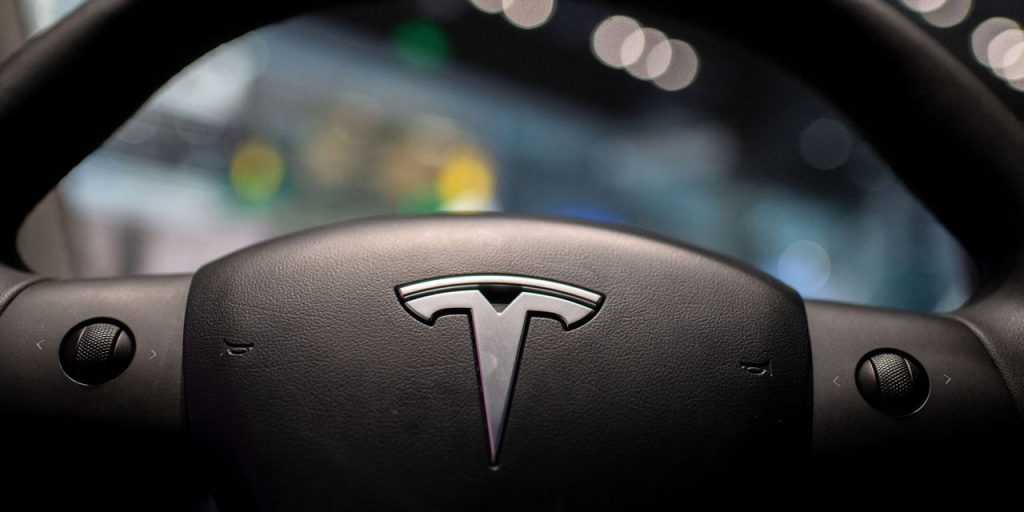Elon Musk doesn’t seem all that worried. The CEO is betting on future profit coming from self-driving Tesla (ticker: TSLA) vehicles. Wall Street’s views are mixed on that idea.
The quarter overall looked OK. Tesla reported first-quarter earnings per share of 85 cents, which roughly matched Wall Street estimates. But automotive gross profit margins including leases, but excluding regulatory credits, came in around 19%, below the 21% analysts projected.
Tesla’s price cuts were responsible for the declines. Musk defended the cuts on Tesla’s earnings conference call. “We’ve taken a view that pushing for higher volumes and a larger fleet is the right choice here versus a lower volume and higher margin,” said Musk. “However, we expect our vehicles, over time, will be able to generate significant profit through autonomy.”
He even floated a radical idea later in the call. “We’re making a car that, if autonomy pans out, and we think it will, where that asset is actually will be worth a hell a lot more in the future than it is now,” said the CEO. “It is technically possible to sell it at zero profit, but still have the net present value of future cash flows associated with that asset [be] very significant.” The profit come later by selling self-driving software.
Investors are a little nervous. Tesla stock closed down 9.8% at $162.99. The
S&P 500
and
Nasdaq Composite
fell about 0.6% and 0.8%, respectively. It is the worst reaction Tesla stock has had to earnings since Jan. 27, 2022, when it fell 11.6%.
And Wall Street analysts have mixed thoughts. Citi analyst Itay Michaeli sees some merit in the strategy though.
“Tesla’s rationale for pursuing price cuts rested on lifetime vehicle revenue, a view that’s fully aligned with our own industry thesis around [autonomous vehicles] being the biggest value unlock of this [industry] race,” the analyst wrote in a report. “Still, for this to anchor the Tesla investment thesis, we’d need to see more evidence of [Tesla’s] Full Self Driving progress given Tesla’s unique approach versus industry.”
He rates shares at Hold and lowered his price target to $175 from $192 after earnings. Baird analyst Ben Kallo kept his price target at $252 following earnings. He rates shares at Buy.
“Musk noted that the most attractive near-term project is to upgrade the existing fleet to include FSD capabilities, which would tremendously increase the vehicles’ asset value,” wrote Kallo. That is one reason for optimism around the stock. He sees other reasons to be optimistic too. “Other longer-term projects include the Dojo supercomputer, Optimus bot, and residential heat pumps.”
Canaccord analyst George Gianarikas was encouraged by growing energy storage sales, too. Tesla installed 3.9 gigawatt hours of battery storage in the first quarter, up from 0.8 gigawatt hours in the first quarter of 2022. He also sees some merit in Musk’s strategy.
“The company is driving its razor/razorblade strategy, intentionally seeding
the market with forward upgradable, high-margin-potential vehicles,” wrote Gianarikas in a research report. He expects Tesla will drop the price of FSD software from $15,000 to boost sales of that product.
Overall, Gianarikas isn’t as worried about price cuts and margins, pointing out that the economy is making it difficult for the entire automotive business, not just Tesla. He rates shares Buy but dropped is price target to $257 from $275.
Wedbush analyst Dan Ives wasn’t as sanguine on margins, or the autonomy strategy.
“Let’s call it like it is: Tesla delivered mixed results with solid demand metrics but the elephant in the room is softer margins that will weigh on shares,” wrote the analyst on Thursday. “The FSD driving the margin story going forward is not a narrative many are huge fans of and we believe Tesla now walks a tight rope between margin pressure versus driving stronger Model Y/3 demand globally.”
He still rates shares a Buy. His price target dropped to $215 a share from $225. TD Cowen analyst Jeffrey Osborne rates share Hold; his price target dropped to $150 a share from $170 following earnings. He doesn’t sound fully convinced about the pricing or autonomy strategy.
“Musk dipped into the well and recycled prior comments around FSD being complete by year-end, demand outstripping supply, and vehicles being an appreciating asset over time,” wrote Osborne on Wednesday. “We question all these assumptions.”
New Street Research analyst Pierre Ferragu sounds more convinced that weakness is tied to the broader economy. “The recession scenario is on,” wrote Ferragu Thursday. “Demand [for Tesla’s vehicles] remains above supply, but at the cost of a string of price cuts, reacting to a steep drop in auto demand in China and multiple signs of weakness across the world.”
He rates Tesla shares Buy and reduced his price target to $300 a share from $320.
The reasons for the stock’s decline, as well as Tesla’s pricing strategy, will continue to be debated by analysts and investors. One thing that seems certain: Investors are in for a rocky few months.
Overall, 52% of analysts covering Tesla stock rate shares at Buy. The average Buy-rating ratio for stocks in the S&P 500 is about 58%. The average analyst price target for Tesla stock is now about $198 a share, down about $5 after earnings.
Write to Al Root at allen.root@dowjones.com
Read the full article here




